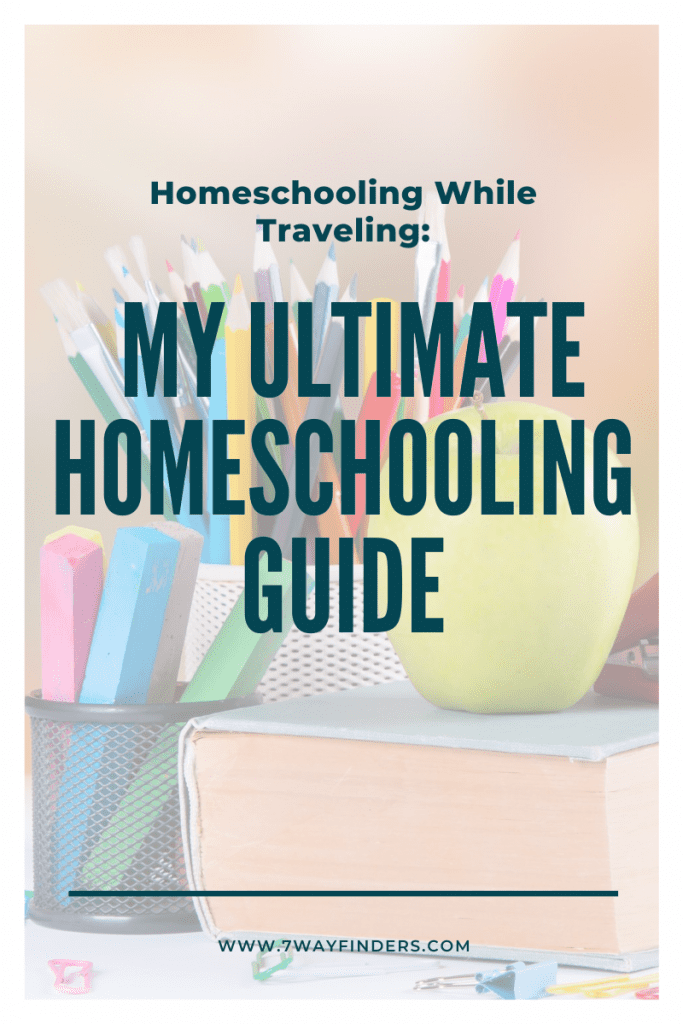

Are you considering traveling the world and wondering how you’ll educate your kids at the same time? It may seem impossible, but I’m here to prove it’s not. In this post I will give you a rundown on all things “homeschooling how-to.“
Are you sick of staying home from travel and enduring the rigid structure of traditional school? Let me introduce you to homeschooling.
With the onset of Covid, many children have been forced home from traditional schooling and many parents have been left wondering what homeschooling options even are. Don’t worry, I’ve got you covered!
I spent two years homeschooling my five kids as we traveled the world as a family of seven. I may not be all-knowing, but I’ve sure learned some helpful tips along the way.

I’ve talked with dozens of homeschoolers, unschoolers, worldschoolers, and more all over the world. I’ve also spent hours scouring homeschooling Facebook Groups and forums. It is very interesting to hear the many unique approaches different families take when it comes to at home education. The decision to homeschool (voluntarily) is a deeply personal one and one that has several considerations.
As a homeschooling mom, I’ve tweaked, added, and subtracted to our at-home education many times. You can read what I started with in my worldschooling journey and how I changed things up after a few more months.
Mistakes inevitably come with the territory of homeschooling and teaching children. As long as you are willing to recognize them and make adjustments as needed, you’ll be great. I’ve made plenty of mistakes along my journey, but I’m always trying to improve and offer myself grace.
Because my husband and I both work in our various business ventures, we have had to balance homeschooling while simultaneously working. As full-time travelers, working is essential to fund our venture (You can learn more about how we afford to full-time travel here.) That being said, I can relate to all you working parents who are trying on the new hat of “teacher” at the same time.

Throughout the remainder of the article I will present you with many homeschooling options in an effort to help you find the best homeschooling program for you. Ultimately, like mentioned above, choosing to homeschool your children is intensely personal and needs to be built to suit your family.
Would I argue that everyone should homeschool their child? Nope, certainly not. However, I would argue that most parents can homeschool and for most kids, it will be a better experience than public school.
The homeschooling vs public school debate will live on forever. Just as parenting is unique and individual, your child’s education is as well.
Besides the obvious answer of location (duh!) in the public schooling vs homeschooling differences, the types of education differ on much deeper levels as well.
Public schooling metrics are dictated and upheld by government agencies. These agencies have managed to create a “blanket statement” of goals that every child should, and must, learn in order to consider the student and teacher “successful.”
Public schools do their best to create a style of learning that works for all students, knowing clearly that all children learn in their own, unique way.
Do you see the same problem with this that I do?
The “failure” lies in trying to apply “sameness” to all children. Any parent with more than one child will attest to how unique and individual each child is from birth.
Personalized education and teaching techniques are, of course, impossible to execute in large class sizes. Because of this, we have to default to the well-intended blanket standards for all.
Homeschooling ultimately offers the benefit of FREEDOM. Freedom for you as a teacher, freedom for students and freedom to educate in whatever way works best for those involved.

I’d be willing to bet that most school teachers would pay a hefty price to be able to cater their lessons and teaching style to each individual student. They can sense the differences in learning styles, yet out of necessity must move forward with approved lesson plans and mandated standards of learning.
If you take only one thing away from this discussion about the benefits of homeschooling, I want you to try to capture the gift it is to cater the programs to you and your child.
Other advantages of homeschooling stem from this core value of freedom: facilitates quicker learning, less fighting about school, learning alongside your child, allows progression at your child’s own pace, and much more.

My bet is you are here looking for a quick reason why you aren’t qualified to homeschool. Fact is, none of us are homeschool teachers when we begin! This process includes a learning curve for all.
The only people who should not homeschool, are those unwilling to try, adapt, recognize mistakes, change, and mostly love their child through the process.
The disadvantages of homeschooling fall closely into the same category as their advantageous counterparts. Similar to the advantages of homeschooling, the disadvantages also center around freedom.
A parent who chooses to homeschool doesn’t get the “free babysitting” hours that public school provides! Of course, school is much more than this and teachers are doing their very best to make it successful for students. With homeschooling, there are no breaks when you are the parent and the teacher.
However, as you’ll soon come to find, the same amount of learning can be done at home in a fraction of the time it takes in a classroom. Ultimately what you really lose is the time away from your kids while they are at public school. Some will see this as a curse, others as a blessing!
As a mother of five, I completely resonate with this. Since the birth of my first child I daydreamed about the day when all my kids would be in school for hours everyday. What freedom I’d have!
Sadly, in our current COVID environment, this “perk” is not an option. It’s possible kids will be home all the time in the near future, just as they have been at times throughout the pandemic.
I’ll also be honest and upfront: homeschooling your child is work. It’s not impossible, it’s not even that difficult, but it IS work. You do have to be invested emotionally, mentally and physically to succeed. Even if you pay big $$ for a program with a dedicated “teacher”, you still are responsible for making sure your child is participating and working as they should.
We’ve all heard it said before, “homeschooled kids are weird.” There is a stigma surrounding homeschooling that just isn’t true.
One positive thing that came from the COVID pandemic is evidence of how silly this is. Did your kids become social misfits during your months of lockdown? Of course not!
You may have to get a touch more creative in your socialization methods for your child, but your kiddo will be fine!
Do you have neighbor kids? Siblings? Go to church? Play with kids at the park?
Your homeschooler can still get loads of socialization outside of a classroom. After basically sheltering our kids away for the last two years as we traveled, I’d even argue it’s better. You get to choose the socialization methods and partners versus shoving your kids in public school with all the bullying and comparison.

At this point in the process, you may be wondering how to homeschool. Your kiddos might be wondering how to be homeschooled. Don’t worry, we felt totally overwhelmed in the beginning too.
Overcoming the hurdle to homeschool was a major issue for me when facing down our full-time travels. I never wanted to homeschool! Frankly, I never considered myself patient, qualified, or creative enough to take on that role.
I’m here to say you can do it!
A simple answer is this: you decide what is important to you for your child to learn, do, see, and experience. You find the resources to match your goals and get started.
The long answer involves lots of research, soul searching, and talking with those important in you and your child’s lives.
It sometimes means starting something that you think is important, only to find that you don’t have the time for it, your child hates it, or it isn’t that important afterall.
How homeschool works totally depends on you and your goals! In fact, there are so many styles of homeschool it’d make your head spin.
Let’s visit some styles of homeschooling.
Unschooling is a curriculum for homeschooling, centered on inquiry-based learning (and I’m using curriculum loosely). Unschoolers are quickly growing in popularity. I’ve met several throughout our travels and see more and more online everyday.
From the way I understand it, unschoolers don’t want to force a child to learn something they are not interested in. If your child prefers to do math today, great. If they want to go on a walk and learn about birds instead, that’s also great.
The goal is to capitalize on the natural curiosity of your child and let them learn as and what they wish. You might delve deep into engineering or biology instead of forcing all the basic subjects on your child.
In one of the many homeschooling forums I belong to in Facebook, I found this account in a discussion about unschooling:
Lona: I have six kids. Two have graduated from college. One is currently in college and three are being homeschooled. I homeschooled all of them from the beginning.
I’ve read ALL the books! With my first three I unschooled almost exclusively. One child was motivated, two were not.
The unmotivated ones were not prepared for college math classes. Science classes were hard but doable, and they all placed in honors writing. But, the math is not something you can catch up on quickly!
My 17yo is a sophomore in college but he still hasn’t completed college algebra. He was pretty far behind when he started. I encouraged, but never forced. I even took college math classes “for fun” to inspire him! He had no desire.
Now he wishes I would’ve made him do it! It was the exact same with my 19yo. So, now my younger children do some formal schooling every day. I do homeschool three grade levels now: 6th, 4th, & 2nd.
When we travel the only formal school is math and writing. Everything else is experiential. My older kids say I should do formal science, too. But… I’m still working on that!
Unschooling comes with it’s own risks and benefits, as do all programs, but has many beautiful parts to it. It is not my personal favorite, as I don’t feel it sets kids up for long-term success in higher education, but that may not be important to you.
If I had to categorize myself, I’d pin myself as this kind of homeschooler. I homeschool to travel the world and subsequently use the world as part of my “lesson plan”. Worldschooling involves the experiences of travel, different cultures, new people, etc. to teach more than a traditional classroom can.

We learned about the history of Rome on our tour of the colosseum. Sea life was encountered and taught about on the seal colony shores of New Zealand. Chinese culture and tradition are burned into memory as we walked a morning market in Chengdu, China.


Many travel families choose this style of learning with varying levels of focus on other “basics.”
I personally still work hard to teach reading, writing, and math while we travel. However, some families use reading road signs, converting currency, and more as their teachers.
Travel is usually a driving factor for this style of learning, but doesn’t have to be. There are dozens of ideas for educating about the world from your own home.
For example: You could do a learning unit on China and use online resources to see and experience much of China right at home! You could cook a meal, learn calligraphy, watch documentaries on China, etc.
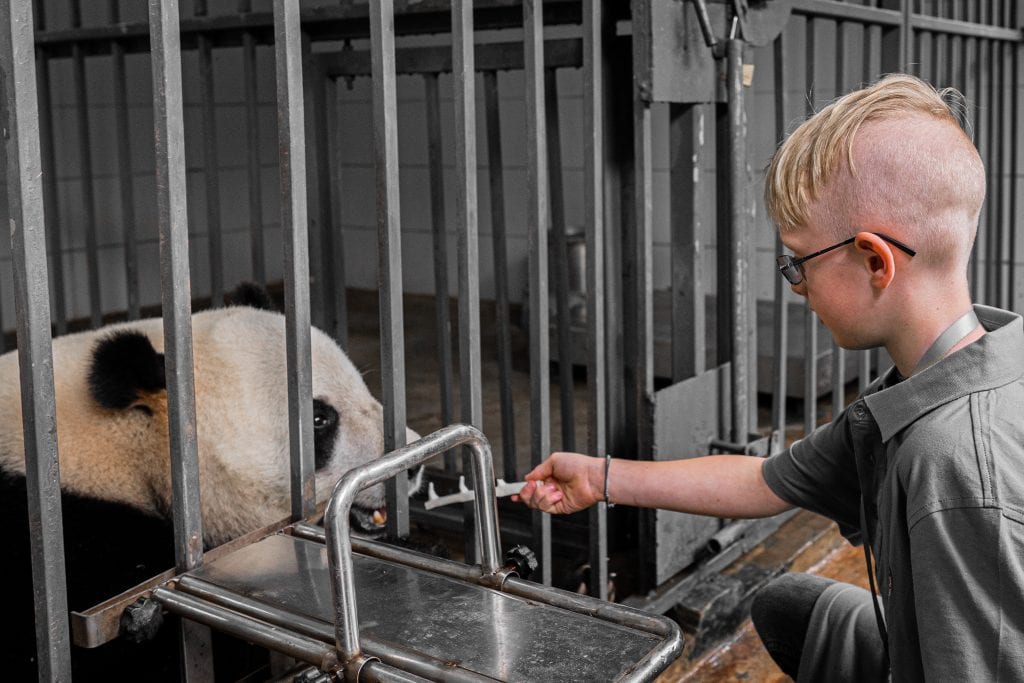
Modern technology provides amazing online homeschooling options. We live in such a blessed age in this regard.
Later in this post, I will compare various online programs from free online homeschooling to paid tuition programs. There are dozens, perhaps hundreds, of online homeschool programs.
Choosing your homeschooling programs online takes some time and lots of research. Generally, these programs will dictate a curriculum by grade-level or age in various subjects. They tend to follow similar standards as state education mandates.
Time commitment in these online homeschooling programs varies widely. For some programs, you implement everything yourself with activities, printouts, online games and more.
In other programs, you’ll be given video lessons to progress through or even virtual meetings with teachers. You can select a program that fits your level of involvement, time commitment, and the resources you want to use.
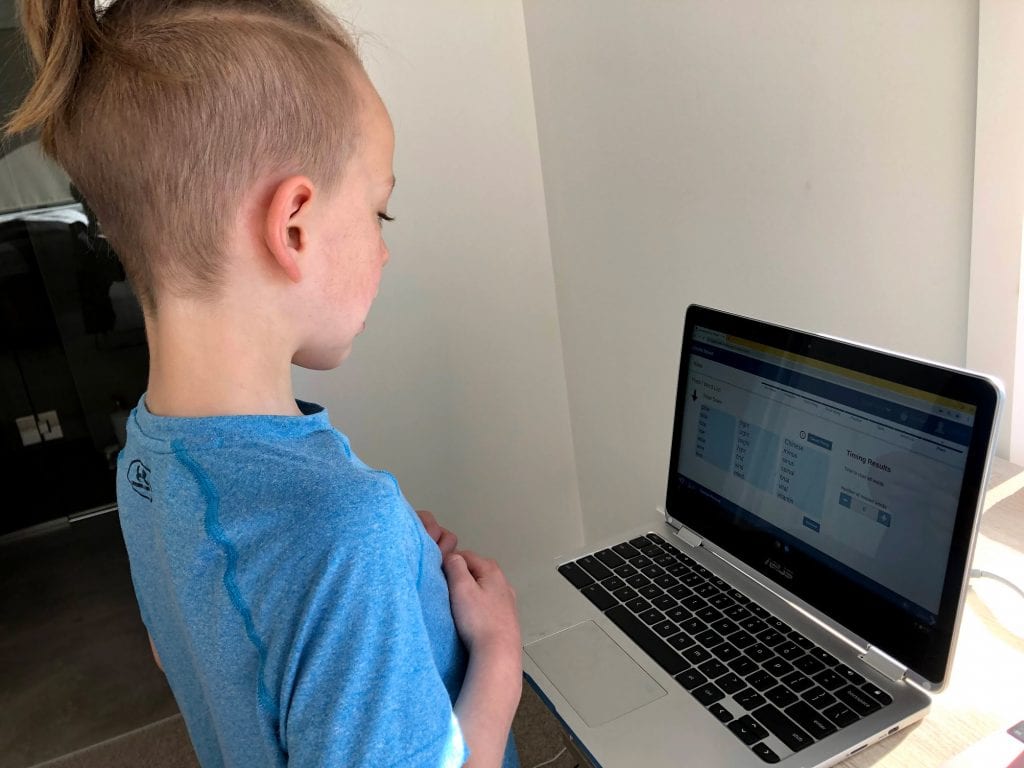
Homeschooling with books might feel more familiar to some of us “older” parents that didn’t grow up learning in school online. This teaching style might involve books, blackboards and other printed material.
You can find many programs in printed books that follow lesson plans and allow you to teach it all.
Out of necessity, we took as little printed material on our travels as we could. We did bring about half a suitcase worth of handwriting books and math workbooks, but all of our lessons are online.
It’s my personal opinion that you do not need to officially homeschool before kindergarten. Frankly, as long as you are working on letter recognition, learning to read, and basic addition and subtraction, you’ve even got homeschooling kindergarten covered.
I got serious about homeschool starting in first grade for my third child. We did homeschool kindergarten, but it was pretty light an relaxed with online programs. For my older two, they simply followed the programs they’d left at their previous elementary school.
When we returned to the US to spend some time with family, my mother was shocked that my 3-year-old didn’t recognize her colors, couldn’t count to 10, and didn’t know the alphabet. I just laughed.
I feel like the minds of toddlers are sponges and she will learn in no time! I’m certainly not worried about her progress before she would even be in preschool. However, I’m a bit relaxed about it, I guess?
Homeschooling a preschooler is totally doable and you can spend as much money as you’d like on the resources to do so! Or you can use some of the free resources I’ll present below to do so. Homeschooling benefits apply to all ages: time with you, growth and learning

You might be wondering if your child can get too old for homeschool? Can you homeschooling in high school?
Most homeschool families find elementary and middle school the most comfortable ages to homeschool. However, homeschooling a high schooler is not only do-able, but more common than you may think.
I absolutely LOVE this blog from a past worldschool student, who is now a successful adult. I secretly hope my Lucy (now age 12) can follow a similar path and be blogging about it in the future.
The benefits of homeschooling absolutely can continue into high school. You might need a bit more planning, but there are amazing resources on it! I will share more below, so keep reading.

We’ve already covered many facets of homeschooling, but a lot goes into this decision! Despite the many incredible homeschooling resources available, this is a family choice and one that might change your life paths forever.
You may want homeschool to speak so deep to your soul as a parents or have it be the only way you want your child to learn. I don’t mean to scare you, but I want you to realize the gravity of this decision! It’s a time commitment, but it’s also a lifestyle commitment.
There are amazing benefits to homeschooling. There are differences to homeschooling as well, which can be seen by some as cons. We’ve discussed a few of the pros and cons to homeschooling, but just to highlight a few more:
Don’t let these pros and cons for homeschooling scare you. I promise you can do this!
Do you have goals in mind when it comes to homeschooling? Some of them might include:
These goals will change how you homeschool. It’s important to define your “why” before you pick a program and begin.
What else do you have going on in your life? Stay-at-home parent, working parent, part-time working parent… whatever your situation, you’ve got other things to do besides homeschool.
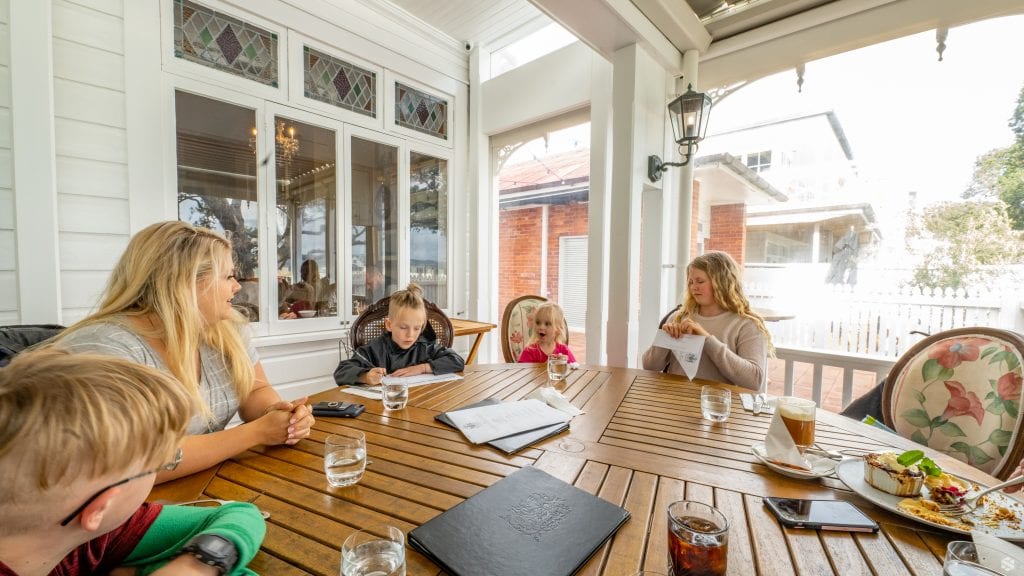
Homeschooling while working from home is tricky! I’m not going to lie, it will stretch you. I’ve been homeschooling while working full time for the last few months and I feel a little like my head will spin off at any moment.
My advice for working parents who also want to homeschool:
When selecting your homeschool program, you’ll need to be realistic about your schedule and how much time you can dedicate each day.
Remember life goes on! You’ll still need to cook, shop, clean, do laundry, doctors appointments, etc. Don’t overextend yourself or try to do too much. If you do, you’ll burn out of the role very quickly.
Don’t worry if your house get a bit messier as you homeschool, that’s normal and O.K!
Surprisingly, homeschooling can be pretty expensive! While some programs run thousands of dollars per year, there are also lots of free homeschool curriculum options.
I settled somewhere in the middle. We spent about $300-400 per year on our homeschool.
You need to decide what kind of $$ you are willing to commit to homeschooling. If free homeschool is your only option, no worries! I’ve found a few options for you below that are great.
If you’d like an expensive program but don’t have the money, know that some have scholarship options. You’ll need to look into the requirements for each program individually.
I also have a friend who gets tuition paid for through a local charter school. This is an option to research in your local area.
Some places in the world will even “pay” your tax dollars back to help offset homeschool. For example, “In Alberta, home education provides each child $850.00 per year to offset the cost of resources.”
Because every state and country is different, you’ll need to do your own research on the options available to you in your area.
Local government regulations differ greatly on homeschooling. It is actually illegal to homeschool in certain countries, like Germany, and difficult in others.
Within the USA, each state is a bit different on their regulations. Some states will require testing at the end of the year, some states may dictate certain curriculum to you, and other states don’t care.
Because we left for our world travels from Utah, that is where I registered as a homeschooler. This simply meant I went into my local school district office and signed a document in front of a notary. I haven’t heard a single peep about it since then!
Again, do your research on your country and/or state around homeschooling regulations.
Do you already know how your child learns best? Probably not. You haven’t been their teacher yet!
If you already know, good for you! You can tailor your curriculum to them.
Does your child like to read? Do they enjoy learning hands-on? These may be things you learn along the way as you homeschool.
You can even consider asking their past teachers for their input. However, unless they were a problem student or excelled, their past teachers may now know them all that well.
I found my kids’ past teachers to not be very helpful on this front, personally.
What schedule are you looking for in your homeschooling? Are mornings best? Do you want to go somewhere in the afternoon? Does your family sleep in?
In our travels, we decided to homeschool for several hours, three days a week. The other two weekdays we did light homeschool (like the programs they wanted to do) or no official homeschool, as we ventured around the world.

This schedule fit our work schedule, mostly. We usually started homeschool after breakfast. I’d encourage the kids to get started even before breakfast if they wanted, but this was rare.
If we had a fun event planned for the day, I warned them the day before that school had to be done by a certain time.
Occasionally, we tried to homeschool after a fun day out, but it rarely worked. We tend to stay out as long as possible and only return for bedtime.

How many hours a day should you homeschool? Great question!
According to this article, most parents are homeschooling TOO much. I’m certain I’d fall into this category! Check out these snippets:
“For pre-Kindergarten, there should only be about 20-60 minutes a day of distance learning, it recommends. And though that amount increases with each grade, it’s only about two hours max for elementary school students and four hours for high school kids. This should all be accompanied by additional optional work, engagement opportunities, and enrichment opportunities, which range from reading to building a fort.”
“We recommend that true homeschoolers, spend about an hour to two hours a day for those elementary years, two to three hours a day for middle school, and three to four hours a day for high school,” Jessica Parnell, the CEO of Edovate Learning Corp and homeschooling program Bridgeway Academy, told SheKnows.
The thing is, though your kids might be in school for six or more hours a day, they’re not spending all that time listening to academic instruction.
“We did a study back in 2010 with a research group of a little over 1200 teachers who tracked for three months the time they spend in the classroom teaching new material, and the average was seven minutes in a class period,” Parnell said. “There’s a lot of time when teachers are settling the class down, collecting homework, reviewing homework, dealing with disruptions. So a lot of time at school is not necessarily wasted time, but certainly not teaching time.”
Any parent already knows having 30 kids in a classroom means there is little lecturing and a lot more chaos management. While volunteering in my kid’s classes before we left, I noticed how little “teaching” time there was and how much time was spent getting the kids to focus!
During our travels, I spent between 3-6 hours per day homeschooling. However, a lot of this is my kids goofing off!
Remember when you are homeschooling multiple children, you can only really focus on one at a time. The others will certainly waste time and goof off. Just expect it.
Another important question is how many days per year you want to homeschool? Do you want to go year-round. Do you want summers off to match other kids and/or family?
We chose to do year-round school since we would be traveling and working year-round. We took 1-2 weeks off at Christmas, 1-2 weeks in the summer, and then 1-2 additional weeks off when we all burnt out, hit a great hotel with a kids club, or went on a cruise or tour.

Personally, this factor doesn’t weigh heavily for me, but some parents might want to do testing for their homeschoolers. Some states or countries might even require it.
I’ve never worried about it much since Utah doesn’t care and I figure my kids are sticking to their “grade” level studies well.
Also, school is compulsory almost everywhere. What does this mean? It means in almost all countries, school-age children are required to be educated. Even if you are an illegal alien in a country, your child probably can go to school.
Even if you did nothing for a year, schools will have to take your children back to school! Kids catch up quickly. I’ve had several homeschooling parents reinforce this to me: even if there are gaps, when you send your child back to school they will catch up in 2-3 months, max.
However, if testing is important to you, here are some great resources for testing.
I will say, I have heard testing in general can be a weak point for homeschoolers. Perhaps it would be a good idea to incorporate more!
Hopefully at this point you’ve got a good idea of what is going to fit your family best when homeschooling! Let’s get to the nitty gritty of some options for you.
Online homeschool curriculum will be the most prevalent and easiest to connect to. However, I’ve included options for several types, price points, etc. These programs all come recommended in homeschool forums, by my friends, or through word-of-mouth.
When picking your programs, realize you can choose more than one! One of my favorite programs, and the one we’ve used for that last two years, is Kids Online Academy. It is like picking “credits” for college. From their site:
“Kids On Line Academy is a great option for this coming school year. Take out the uncertainty and decide which courses to use at home or anywhere in the world. Just like at a college or university, you pick the courses you want to enroll in and pay for the credits for each. This means that you can take just one course or many. You are able to pick and choose what will work best for you and your current educational situation. KOLA can be used to complement another program or provide a complete/full load of courses.
Kids On Line Academy is a private online school so you can be enrolled in KOLA along with any other public or private school all at the same time or it can be used as part of your homeschool curriculum.”
After my initial hours of research, I loved this option. There are several options for each subject. However, I used a totally different program for math and cherry-picked workbooks from different recommendations.
If this program sounds like the right fit for you too, you can use code “Leslie123” to waive your application fee. *I don’t get any commissions for sharing this, but Cara, the owner, and I both want to empower parents in this difficult time!*
If hand-picking curriculum is too overwhelming, you can also get an all-in-one solution that covers all the basics.
Do you want your homeschooling to be accredited? What does this even mean?
This article gives a great background on what this means. Basically, unless you are very interested in a future sports scholarship or a certain college that doesn’t accept homeschooling readily, I don’t think it’s something to worry about.
The same article states, “No state requires that a homeschool program, curriculum, or diploma be accredited (in fact, curriculum can’t be accredited!) Most institutions of higher learning do not require this either, although there may be exceptions by individual institutions or programs; and of course schools may change their requirements at any time.”
From one of my homeschooling forums, one mom wrote this: “curriculum can never be accredited. Only a school can be. If you are doing an accredited homeschool program, it means your child is a member of a school, and you just so happen to do the work at home. Accreditation is not required- even for college entry- and in fact some schools are not accredited.”
There are several organization that provide accreditation. For more information, you can research these two sites and start down the rabbit-hole:
Yet another option for homeschooling parents is to pool resources within small groups and have your children taught together. I’ve known several homeschooling parents who have formed groups and hired a tutor or a college student to teach a certain subject.
My friend Valerie, a mom to six and long time “homeschooler”, shares this,
“Homeschool suggests everything takes place within the home, and in my experience, a “home education“ takes place all over the community, and even the world. A “custom” education focuses the education on the child, not on the method. Throughout the years, my children have had classes within the home, with co-ops, commonwealth schools, private schools, tutors, and public schools.”
Valerie also helps to run a commonwealth school. She says, “We all will attend a commonwealth school once a week. There are commonwealth schools in the western United States, not just my state (there’s even one in Tanzania). A commonwealth school based on the Leadership Education Mentoring Institute (LEMI) and A Thomas Jefferson Education book, is limited to 30 families who all contribute to the teaching and work of the school.”
Valerie shares a ton more info and advice in a separate post, found here.
Take some time to consider how much “community” you want in your homeschool experience. You don’t have to do it alone!
I don’t have much knowledge on this type of learning, but have heard it around some of my forums and want to present it as an option
From this site, “Game-based learning describes an approach to teaching, where students explore the relevant aspects of games in a learning context designed by teachers. Teachers and students collaborate in order to add depth and perspective to the experience of playing the game.
Good game-based learning applications can draw us into virtual environments that look and feel familiar and relevant.”
Perhaps this type of learning is something to check out for your child.

What subjects are important to you for your child’s education? Take a moment to consider each of the basics:
Filling each of these subjects can vary widely. For example, for writing (which tends to be a weak point for many students in general and one of our hardest subjects), you can consider notebooks back and forth.
We did travel journals during our world travels. I made my older kids write once per week about something we’d seen recently. We would include little mementos like tickets, postcards, or stickers from that event.
In case you have a serious case of wanderlust like us and plan to travel while you homeschool, let’s touch on homeschooling on the road.
You’d be shocked to learn how many families do this. I know of dozens of full-time RV families around the USA and I’ve connected with dozens more full-time travel families that are homeschooling while traveling.
You can choose from all the same options below to work for you as you travel. There is no one-size-fits-all for homeschooling for traveling families, just as there isn’t for homeschooling families learning at home.
Typically, travel families are going to use the curriculum from their home country. It’s what is familiar and works best if they return “home.” American families tend to do American homeschooling overseas.
I’ve already stated many of the benefits of “worldschooling” above, but let’s touch on a few more.
The benefits of schooling around the world can include:
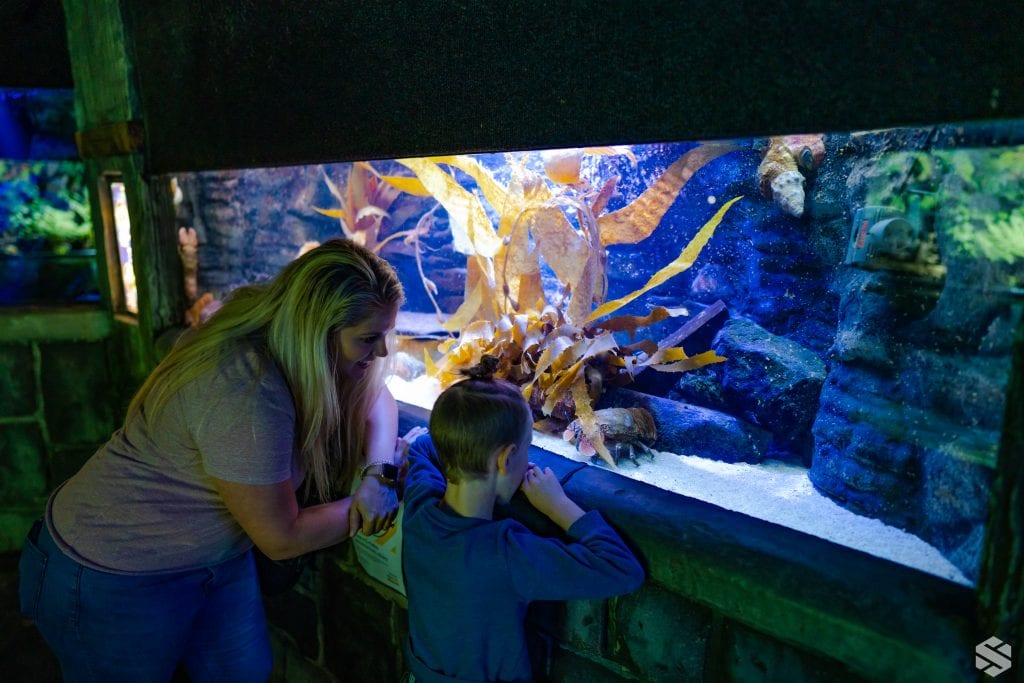
If worldschooling is your goal, which I hope to inspire everyone to do at least once, keep these things in mind when picking the program for you.

From a worldschooling forum I am in, one mom shared: “I am going to give you my best piece of advice from a decade of worldschooling. Do not pressure yourself or your children to replicate school at home by getting stuck on curriculum, workload, and time frames. Kids are built to learn from the world around them. They absorb more than you think from everyday interactions.”
Finally! We are to the point of picking out a program that is right for you. Whether you are looking for free online homeschool, kindergarten homeschool curriculum, or homeschooling high school, I hope these tables can offer something to you!
I’ve spent hours researching these. Forgive any errors! There is no best homeschool curriculum for everyone, so use these as a starting point for what will be best for you.
Kahn Academy
Price: Free
Time commitment: self-guided, low to high.
A free and incredible resource for learning! We’ve used Kahn off and on for a few years. You can find videos on nearly any subject from math to history to science. You can even learn another language! This resource requires you to be completely self-guided and driven.
Easy Peasy Homeschool
Price: Free
Time commitment: daily lessons, low-high.
Easy Peasy all in one homeschool is Christian based, homemade program that has gained loads of popularity among homeschoolers.
k12 Homeschool
An accredited option that connects you with a school local to you. I believe they work with your local school to get the tuition paid for, but I don’t completely understand it. I have seen several reviews of other homeschool parents that do not like this program, but it’s worth more research if it sounds like your thing.
Connections Academy
Price: Free for K-12th
Time commitment: guided, mid to high.
Similar to K12.com. Works with a local school that might be accredited.
CK-12.
Price: Free for K-12th
Time Commitment: self-guided.
STEM based learning (math and science focus). Feels like a Kahn Academy, but with written textbooks online. It seems that schools also work with this site to replace their textbooks.
Bridgeway Academy
Price: $$$$, K-12th
Offers both secular and Christian options. Works with various educational options to create a customized plan for you. They will do an assessment and create a plan for each child. Fully accredited.
Abeka Homeschool Price: $$$, PreK-12th
Christian based. Offers a free week trial to their video lessons. You have the option to buy materials and teach yourself or also access their video lessons. Accredited or independent study options (compare here). Options for dual-enrollment for high school juniors and seniors to earn college credit.
Forest Trail Academy
Price: $$$$, K-12th
Private school registered in Florida. Online learning or correspondence courses. Secular and Christian programs available. Homeschooling program is K-8th and is a traditional book program (think paper and pencil). Online courses are offered as well with dual-enrollment and NCAA courses available.
Laurel Springs
Price: $$$$$, K-12th
Begin classes anytime of the year (rolling enrollment). Flexible schedule. Option to enroll in one course to give it a try.
K12.com
Price: Free, K-12th
From what I can gather, this program works with local schools in your area to get you an online school that is accredited. I’ve heard several reviews of parents that do not enjoy this program, but it is free, which is a big deal!
Williamsburg Online Academy
Price: $$$$, Grade 6-12th
Focus on college prep and higher test scores for college entrance exams. I have a homeschooling friend that really likes this program for her son, but it is a lot of course work and there is the potential to fall behind if life gets busy. Classical education focused on leadership and other areas.
GlobalVillageSchool.org
Price: $$$ K-12th
TIme commitment: self-guided or directed, low to high.
Focused on sustainability, this online school is accredited according to their website. Offers various options to “unschoolers” and more traditional homeschoolers.
International Virtual Learning Academy
Price: $$$ K-12th
One christian option available as well as five traditional school programs. Expect about 1 hours per day per course. Live homeroom sessions to interact with other students.
Connections Academy
Price: Free, K-12th
Time commitment: guided, mid to high.
Similar to K12.com. Works with a local school that might be accredited.
BYU High School
Price: $$$, 9-12th
Enrollment into a scheduled program or home study available. Diploma option available. Standard and advanced tracks available.
Abcmouse.com
Price: $
A fun learning platform that builds as you progress. We’ve been using this long before we left to travel and all my kids have enjoyed it through about age 6. I’m pretty sure Harrison has learned all of the nursery rhythms from the cute videos on this program.
Time4Learning
Price: $ PreK-12th
This program is customizable to you. You can select different grade levels for different subjects (which is fairly common when homeschooling to have your child move at a different pace in each subject). I’ve seen dozens of great reviews for this program and it would probably the one I try next!
Kids Online Academy
Price: $$ PreK-12th
Time commitment: self-guided, low to high
This is the program I’ve been using for the past two years. I really enjoy customizing to each of my kids. This basically gives you access to the same programs kids are using in traditional schools. In fact, we used many of these programs in the schools my kids attended before we left.
adventureacademy.com
Price: $
An “older kid” version of abcmouse.com from the same creators, this platform is for ages 8-13.
Time4Learning
Price: $ PreK-12th
This program is customizable to you. You can select different grade levels for different subjects (which is fairly common when homeschooling to have your child move at a different pace in each subject). I’ve seen dozens of great reviews for this program and it would probably the one I would try next!
Kids Online Academy
Price: $$ PreK-12th
Time commitment: self-guided, low to high
This is the program I’ve been using for the past two years. I really enjoy customizing to each of my kids. This basically gives you access to the same programs kids are using in traditional schools. In fact, we used many of these programs in the schools my kids attended before we left.
Leadership Education Academy
Price: $$ K-12th
TIme commitment: paced, mid to high.
An interesting blend of a customized program with virtual mentor classes. Virtual classroom sessions are scheduled on Pacific time and recorded for later viewing. Perhaps not complete enough to serve as your only education, but I’m not familiar with it enough to say for sure. It seems to be somewhat accredited for high school courses through Williamsburg Academy.
Galileo
Price: $$$$ Age 8-18
Time Commitment: self-guided, take breaks when you want
A great option for worldschoolers, unschoolers, and homeschoolers. This program allows flexibility to students for what interests them and prepares them for the future by exposing them to entrepreneurship, technology, and global citizenship. They do offer sibling discounts and scholarships.
evan-moor.com
Price: $$ PreK-6th
Books to use for self-guided teaching. Homeschooling bundles available with a discount.
carsondellosa.com
Price: $ Pre-K- 12th
Affordable supplements or grade workbooks by subjects.
hookedonphonics.com
Price: $$
Learn to read program. Digital access for up to 3 children on 3 devices with supplemental paper books. You can also buy supplemental readers by level.
littlelearninglovies.com
Price: $
Printables to use for supplements to your homeschool or regular schooling. This site has darling resources! Spelling tests, US geography, etc.
WriteShop
Price: $ K-11th
Writing supplement books. Writing can be a difficult part of homeschool and these come recommended! Read reviews here
Easy Peasy Homeschool
Price: Free
Time commitment: self-guided, low.
Christian based, homemade program that has gained loads of popularity among homeschoolers.
Monarch
Price: $
Time commitment: Guided, mid to high.
Interactive, Christian-based, completely internet-based curriculum. No need to install software and compatible with most operating systems. Grades 3-12. For more programs that cover K-12 from the same company, see here.
The Good and The Beautiful
Price: $$ PreK-8th
Time commitment: self-guided, high.
Christian based, book-based curriculum. These are printed courses that you buy from their virtual storefront or actual warehouse in Lehi, Utah. A good friend of mine who is a teacher and long-time homeschooler LOVES this program. It didn’t work for me to carry this many books in our travels, but I’ve heard several good reviews.
Bridgeway Academy
Price: $$$$, K-12th
Offers both secular and Christian options. Works with various educational options to create a customized plan for you. They will do an assessment and create a plan for each child. Fully accredited.
Abeka Homeschool
Price: $$$, PreK-12th
Christian based. Offers a free week trial to their video lessons. You have the option to buy materials and teach yourself or also access their video lessons. Accredited or independent study options (compare here). Options for dual-enrollment for high school juniors and seniors to earn college credit.
Forest Trail Academy
Price: $$$$, K-12th
Private school registered in Florida. Online learning or correspondence courses. Secular and Christian programs available. Homeschooling program is K-8th and is a traditional book program (think paper and pencil). Online courses are offered as well with dual-enrollment and NCAA courses available.
International Virtual Learning Academy
Price: $$$, K-12th
One christian option available as well as five traditional school programs. Expect about 1 hours per day per course. Live homeroom sessions to interact with other students.
Hopefully now you’ve got some options for homeschooling! Your next question might be: what about college?
Assuming you want to homeschool for high school, which is totally doable, you’ll need to do some prep for the next step.
Just like many high school students take AP classes or co-enroll in the local community college, homeschool students can enroll in independent study courses and earn college credit!
For example, BYU Independent Study allows enrollment from students 14 years and older and doesn’t require a high school diploma to sign up. Chances are good the college you are considering has the same option.
Going back to one of my favorite blogs, the The Edventure Girl was done with “high school” by 15. Read how she got into university.
Another site, Edx, also offers a platform for college-level courses. From their site:
“If you’re looking to help with your teen’s college prep, consider enrolling them in one of the many classes at edX, a platform that partners with high-ranking institutions like NYU, Harvard, and MIT (as well as international universities, like Oxford and Australian National University) to offer over 2,500 college-level courses. Some are self-paced and available for college transfer credit, while others are taught by qualified instructors—most of whom have doctorates in their fields. “
You and your teen can choose from a variety of standalone courses across the arts and humanities, STEM fields, music, computer science, education, and more. Most courses, even credit-eligible ones, are free, with completion certificates that will cost about $50 in most cases.
Particularly proactive high school students looking to get a head start on their college career while at home can enroll in an edX MicroBachelors program in popular majors like computer science, for just $166 per credit. Or, they can start earning college credits now by attending the Global Freshman Academy that offers common, foundational first-year courses like English composition, pre-calculus, or college algebra and problem-solving through edX’s partnership with Arizona State University.”
From my research, the most important step towards college after homeschool is to make a short list of the colleges and universities your student might want to apply to.
Then, take some time to research what each requires for entry.
This article has fantastic information about this process. From their site:
“Almost every college/university has an online catalog these days. And inside that online catalog, usually at the beginning, is a section on admissions — specifically on admissions requirements. And there is where it will say how many credits of high school English the college requires, how many credits of math, of history, etc. It will even sometimes list specific courses that the admissions department would like to see the applicant to have taken in high school, like American History or British Literature.”
“Another interesting thing to notice, too, is that many colleges do not require a minimum number of credits even close to what the states require for high school graduation. This can also be very relieving. Frankly, I don’t know why we even care about state requirements for high school graduation. I mean, they’re fine to use as a reference or starting point, but it seems to me that when planning high school we tend to forget one of the great perks of homeschooling — the fact that we are in charge. We can decide how many credits our child needs to graduate and what courses he is required to take.”
I love this information from the Time4Learning site:
“Yes! Be sure to do research on the homeschool-friendly colleges and universities your child is interested in attending. Depending on the school, you may need high school transcripts and/or a high school diploma.
All 50 states in the U.S. allow parents to issue a homeschool diploma to a child they feel has met or exceeded the guidelines for high school graduation. There are plenty of templates online; check out the ones at LetsHomeschoolHighschool.com. Some colleges and universities also require scores from tests like the SAT and/or ACT. Colleges and universities have admissions counselors that are available to help you understand and plan for their admission requirements.”
Frankly, all this research has empowered me to feel like homeschooling is an option for many years to come! I used to feel stuck in the mentality that we could homeschool until high school, but I no longer feel that.
Each child is different and this is a decision to be made with each of them individually, but traditional high school does NOT have to be your only option.
Every homeschooler will have their own advice for you. Here is mine!
Let’s be real for a minute: it’s going to happen. Unless you possess super-human patience or your kids are perfect, you’re going to lose your temper.
Kids are going to cry. A lot.
Kids don’t want to do school. At least none of mine do! School is still a chore. They enjoy the learning and they have gotten to the point of enjoying learning to some degree, but I get lots of groans about doing school.
How can we avoid these bad situations as much as possible?
I haven’t read any of these books personally, but they come from recommendations form homeschooling forums or followers. Read them or have another one you love? Leave them in the comments below!
A Well Trained Mind- A Guide to Classical Education at Home
Cure the Fear of Homeschooling High School
How to teach your child to read in 100 easy lessons
Here are more of my posts on Homeschooling:
Digital Resources for Keeping Your Kids Educated
Worldschooling: Homeschooling While We Travel
Good luck in all your homeschooling decisions! I hope this helps you in your journeys, school or otherwise!
Xoxo,
Leslie

